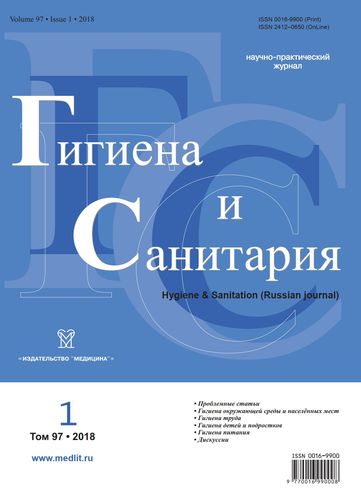Sanitary-epidemiological audit as a tool to improve management effectiveness in the sphere of sanitary and epidemiological welfare of the population
- Authors: May I.V.1, Sedusova E.V.1
-
Affiliations:
- Federal Scientific Center for Medical and Preventive Health Risk Management Technologies
- Issue: Vol 97, No 1 (2018)
- Pages: 90-93
- Section: DISCUSSIONS
- Published: 14.10.2020
- URL: https://archivog.com/0016-9900/article/view/640380
- DOI: https://doi.org/10.47470/0016-9900-2018-97-1-90-93
- ID: 640380
Cite item
Full Text
Abstract
The article considers the legal and organizational aspects of the establishment of a national system of sanitary and epidemiological audit in the Russian Federation. There is described the experience of the functioning of sanitary audit in the republics of Belarus and Kazakhstan, examples of using audit in other spheres of supervision are given. It is shown that in the context of the administrative reform of the control and surveillance activities, the sanitary and epidemiological audit can partially replace the state planned control of low and moderate risks to human health, releasing the resources of the state authorities for overseeing high-risk objects. The creation of the system requires the normative consolidation of the registration procedure and the functioning of organizations with the right to implement activities in the field of sanitary and epidemiological audit, the development of rules for external control of audit services. It seems that the quality assurance in this area should be ensured by the Federal Service for Supervision of Consumer Rights Protection and Human Well-being in the Russian Federation, under whose auspices the national system can function. An important stage in the creation of a new tool for managing sanitary and epidemiological well-being is the development of a database structure and appropriate software to maintain auditor registers and audit reports. A separate task is to provide methodological and organizational support for the training of qualified personnel.
About the authors
Irina V. May
Federal Scientific Center for Medical and Preventive Health Risk Management Technologies
Author for correspondence.
Email: may@fcrisk.ru
MD, PhD, Professor, Deputy Director for Science, Federal Scientific Center for Medical and Preventive Health Risk Management Technologies, Perm, 614045, Russian Federation.
e-mail: may@fcrisk.ru
Russian FederationE. V. Sedusova
Federal Scientific Center for Medical and Preventive Health Risk Management Technologies
Email: noemail@neicon.ru
Russian Federation
References
- Филобокова Л.Ю. Качество аудиторской деятельности: сущность, подходы к оценке. Аудиторские ведомости. 2009; (6): 79-85.
- Chaplinskiy A.V., Plaksin S.M. Risk Management in the State Control in Russia. Voprosy gosudarstvennogo i munitsipal’nogo upravleniya. 2016; (2): 7-29. (in Russian)
- Control and Supervisory Activities in the Russian Federation: Analytical Report 2014. Moscow: MAKS Press; 2015. (in Russian)
- Agreement on Sanitary Measures to Protect Public and Animal Health in Trade in Live Animals and Animal Products. 1998. Annex I. USA-European Community. Available at: http://eur-lex.europa.eu/pri/en/oj/dat/1998/l_118/l_11819980421en00030063.pdf
- Fedortsova V.A. Audit as an instrument of the state control. Uchenye zapiski Uchenye zapiski Petrozavodskogo gosudarstvennogo universiteta. 2011; (3): 111-3. (in Russian)
- Lupo L. Sanitation Management: Auditing for Prevention. Qual. Assur. Food Saf. 2012; (2).
- Zacchea N.M. Risk-based audit target selection can increase the probability of conducting value-added audits. Journal of Government Financial Management. 2003; 52 (1): 22.
- Prudnikova N.A. Audit of Fire Safety as an element of compliance and enforcement. Yuridicheskie zapiski. 2012; 25(2): 35-9. (in Russian)
- On environmental audit, environmental auditing and amendments to certain legislative acts of the Russian Federation: Draft Federal Law. Available at: http://ecopalata.ru/?page_id=2959 (in Russian)
- Fedorenko E.V. Legal basis for risk analysis methodology while ensuring food safety in the Eurasian economic union and the Republic of Belarus. Analiz riska zdorov’yu. 2015; (3): 13-8. (in Russian)
- Safonkina S.G., Moldovanov V.V., Nechaev V.S., Gololobova T.V., Shubochkina E.I., Ibragimova E.M. Organizational foundations of sanitary-epidemiological audit and industrial control. Natsional’nogo nauchno-issledovatel’skogo instituta obshchestvennogo zdorov’ya imeni N.A. Semashko. 2015; (2): 201-5. (in Russian)
- Savel’ev S.I., Korotkov V.V., Polyakova M.F. Sanitary-epidemiological audit as a modern tool for ensuring sanitary and epidemiological welfare. Sovremennye problemy nauki i obrazovaniya. 2014; (6). Available at: https://science-education.ru/ru/article/view?id=17180 (in Russian)
- Vasvada P.C. Sanitation Audits: the proof in the Pudding. Food Saf. Mag. 2001; 7: 22-8.
- Safonova M.F. The concept of the development of audit as an independent form of scientific knowledge. Nauchnyy zhurnal Kubanskogo gosudarstvennogo agrarnogo universiteta. 2015; (114): 592-609. (in Russian)
- Chan D.K., Wong K.P. Scope of auditors’ liability, audit quality, and capital investment. Review of Accounting Studies. 2002; 7 (1): 97-122.
- Emelin V.N., Zheltova M.F. Audit quality control in Russia: practice and implementation issues. Molodoy uchenyy. 2013; (7): 157-60. (in Russian)
- Filobokova L.Yu. Quality of audit activity: essence, approaches to evaluation. Auditorskie vedomosti. 2009; (6): 79-85. (in Russian)
Supplementary files









